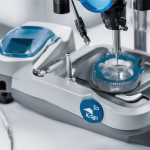Overview of AI Diagnostics in UK Healthcare
AI diagnostics, an innovative approach within UK healthcare, leverages advanced algorithms to enhance patient care and operational efficiencies. This integration embodies an evolution where machine learning and data analysis converge to offer insightful medical assessments. The significance of AI diagnostics lies in its ability to swiftly process large datasets, enabling healthcare professionals to diagnose conditions with precision and speed.
Presently, the landscape of AI technology adoption in UK healthcare is gaining momentum, as institutions recognize the potential benefits of this advanced technology. Hospitals and clinics are increasingly incorporating AI tools to enhance diagnostic accuracy and streamline workflows. This trend is facilitated by a growing acceptance of technological interventions as valuable co-pilots to traditional practices.
Also to see : Brewing Innovation: Proven Tactics for UK Breweries to Conquer the Non-Alcoholic Beer Market
Integrating AI diagnostics significantly improves patient outcomes. By offering precise diagnostics, AI aids in early disease detection, ensuring timely interventions. Moreover, operational efficiency is markedly enhanced, as AI can manage administrative tasks, reducing human workload and minimising errors. Such integration leads to a more effective healthcare system capable of delivering higher-quality care.
In conclusion, the integration of AI diagnostics within UK healthcare serves as a pivotal step towards a more advanced, responsive, and patient-centric healthcare ecosystem. This trend is expected to continue flourishing, redefining how medical care is delivered.
Additional reading : Essential Cybersecurity Tactics Every UK Business Must Implement for Maximum Protection
Strategies for Effective Integration of AI Diagnostics
Integrating AI diagnostics into UK healthcare requires strategic planning and execution. To begin with, assessing organisational readiness is crucial. This involves evaluating the existing infrastructure to determine technological capabilities and potential gaps. Identifying key stakeholders and forming interdisciplinary teams ensures comprehensive perspectives are considered during integration. A thorough needs assessment also helps tailor AI integration to specific organisational goals.
Choosing the right AI tools is vital for successful implementation. Selecting suitable AI tools involves setting criteria such as accuracy, reliability, and ease of use to ensure the diagnostics meet organisational needs. Case studies of successful AI implementations across UK healthcare institutions provide valuable insights into effective tool selection. Additionally, analysing vendor capabilities and ongoing support can further consolidate successful integration.
A critical component involves developing training programmes for healthcare staff. Tailored training modules are essential to equip staff with the skills necessary for using AI technology effectively. These modules should address the specific needs of various roles within the organisation. Evaluating training effectiveness ensures ongoing support and optimisation of these learning programs. By nurturing skills and understanding, healthcare providers can fully leverage AI diagnostics, ensuring improved patient care and seamless operational processes.
Overcoming Challenges in AI Adoption
The adoption of AI diagnostics in UK healthcare presents distinct challenges. One key barrier involves training healthcare professionals to effectively manage new technologies. Ensuring that staff are adequately prepared requires continuous education and robust support systems. Additionally, financial constraints can hinder the acquisition and maintenance of AI tools, accentuating the need for strategic budget allocations.
Regulatory and ethical considerations are pivotal in addressing AI adoption hurdles. Ensuring compliance with UK healthcare regulations is essential to safeguard patient privacy and data security. Regulatory frameworks, therefore, need to be agile, adapting swiftly to technological advancements while maintaining rigorous standards.
To mitigate risks associated with AI diagnostics, healthcare providers can implement comprehensive risk management strategies. This includes conducting thorough impact assessments before deployment and establishing protocols for error mitigation. Regular audits and feedback mechanisms help enhance AI system reliability and trustworthiness.
Enhancing collaboration across interdisciplinary teams fosters a culture of shared knowledge and innovation. By leveraging diverse expertise, healthcare institutions can identify potential integration challenges early on and devise effective solutions. Emphasising a holistic approach, while remaining vigilant about the ethical implications of AI use, ensures a smoother transition and maximises the benefits of AI diagnostics.
Regulatory Framework and Compliance for AI in Healthcare
Navigating the regulatory landscape is crucial for successful AI integration within UK healthcare. Ensuring compliance with existing legislation ensures patient data protection and security, which is paramount in maintaining trust. Key regulations such as the General Data Protection Regulation (GDPR) govern how patient information is handled, underscoring the need for robust data privacy measures in healthcare AI.
Understanding Relevant Legislation
Understanding the relevant laws helps healthcare providers implement AI while safeguarding patient well-being. The Medicines and Healthcare products Regulatory Agency (MHRA) and other bodies ensure AI tools meet health and safety standards. Regulatory oversight adapts rapidly with technological changes, ensuring rigorous assessments of AI healthcare applications.
Implementing Governance Structures
Establishing an effective AI governance framework defines clear roles for oversight, ensuring accountability. By appointing dedicated teams, healthcare organisations can actively monitor compliance and ethical use. Successful case studies, like NHS trusts employing AI for diagnostic imaging, illustrate the benefits of structured governance in achieving sustainable implementation. Governance not only aids in compliance but also enhances transparency, fostering a culture where stakeholders are empowered to embrace AI advancements responsibly.
Measuring Success and Impact of AI Diagnostics
Evaluating the success of AI diagnostics in UK healthcare necessitates assessing specific performance metrics. These key performance indicators (KPIs) help gauge the effectiveness of AI tools in improving patient care and operational efficiency. Common KPIs include diagnostic accuracy rates, reduction in diagnostic time, and improvements in patient outcomes. By tracking these metrics, healthcare providers can determine the impact of AI diagnostics on clinical practices.
Approaching data collection involves a comprehensive analysis of AI performance across different departments. This includes monitoring patient outcome improvements and observing workflow efficiency gains. Data-driven strategies allow institutions to fine-tune their use of AI technologies, ensuring their benefits are fully realised. Regular audits of AI systems are crucial for identifying areas of strength and aspects needing enhancement.
Positive outcomes from integrating AI in diagnostics frequently manifest in faster diagnoses and enhanced patient experiences. Such advancements are vital for supporting healthcare professionals in delivering high-quality care. Additionally, a well-implemented AI system can help reduce operational costs and streamline processes. Raising awareness about these benefits encourages continued investment in AI technologies, ultimately fostering a more innovative healthcare environment.
Future Trends in AI Diagnostics for UK Healthcare
As AI technology continues to evolve, emerging technologies such as deep learning algorithms and natural language processing are anticipated to revolutionise diagnostics in UK healthcare. These advancements are expected to enhance the precision of diagnostic tools, allowing for real-time data analysis and predictive insights. By improving the scope of AI diagnostics, healthcare providers can expect earlier disease detections, personalised treatment plans, and significantly improved patient care.
Predictions for the future landscape envision a more integrated system where AI works seamlessly with existing healthcare frameworks. Technology trends will likely include the expansion of telemedicine, where AI’s role in remote diagnostic capabilities becomes further integrated. The use of AI-driven wearable devices could also become more prevalent, providing continuous patient monitoring and timely interventions.
The role of continuous learning and adaptation is crucial for maintaining competitiveness in UK healthcare. To remain at the forefront, healthcare institutions must invest in ongoing training, research, and development. By fostering an environment of innovation, organisations can ensure that their practices align with the innovations in healthcare and the broader AI advancements. This approach will help to prepare the workforce and infrastructure for future demands, ultimately leading to more effective patient care and operational efficiency.





